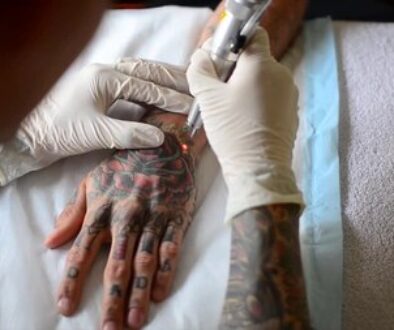Is It Safe To Get Tattooed While You Are Pregnant or Breastfeeding?
[gtranslate]
Better Tattooing has been researching if you can get a tattoo while pregnant. What we found is disturbing. Many articles on the internet inform readers that “it’s totally possible, but maybe you should wait…” which is patently false information. Others report that getting a tattoo while you are pregnant is dangerous because of the possibility of infection.
The chances of getting an infection are always present when getting any work done but this fact disregards the biggest danger of getting tattooed while pregnant. There is an increased chance of sending yourself into spontaneous labor.
Here is an explanation of why this happens and what the risks are.

Table of Contents
A Discussion About Ethics Before Moving On.
The right to choose is paramount for an individual. That choice is something we very much support for women across this planet. There is a chance that this belief can be misconstrued by skimming this article, so we want to get this out of the way before you read on. Women have the right to choose what to do with their bodies. No government, individual, or group of folks has the right to impress upon another their will, regardless of the intent, when carrying a child to term.
This article focuses on the person who has chosen to carry a child to term. Someone who has accepted that fact and made plans for such. This has nothing to do with mandates, freedoms, personal liberty, or any other self-centric ideologies that regress a society to less than its sum.
Onto our research.
What Happens to Your Body When You Get a Tattoo?
A tattoo procedure results in a person’s skin being broken. Tattoo pigment is implanted into the dermis, and a design is forever marked upon the individual. The body reacts specifically to this trauma, making it possible for the ink to stay in the skin.
- As the needles strike the skin, the body begins to repair itself. The immune system fights infection, and the skin starts to remodel to repair the breaks caused by the tattoo needles.
- The release of hormones that stimulate repair occurs after the inflammatory response seen in trauma is imparted on the skin.
- Once a wound is created, the body sends macrophages to clean out the damage and prevent invading pathogens from causing an infection.
- This process is modulated by the hormone cortisol.
The repair process that takes place to heal a tattoo is complex. We will skip over the nuance because we already have an article about tattoo healing which can be found here. You need to understand, though, that cortisol is essential to the process. It is even more important to the pregnant woman wishing to get a tattoo.

What Effects Cortisol Has on A Fetus.
Cortisol is required for the proper development of a fetus. Without enough of it, babies can be born underdeveloped and show delays up to and past early years of life. If too much is received in utero, the fetus will fail to thrive, and there is the possibility of lifelong mental disabilities, illness, and other stress-related issues.
During a tattoo, the amount of cortisol released by the body fluctuates and has the potential to reach levels that are unhealthy for the fetus. This could result in spontaneous abortion, or the other long-term effects stated above.
This is why it is unsafe to get a tattoo while pregnant. The stress hormone release is, or can be, so great that the fetus is subjected to the body attacking it and trying to expel it from the person carrying it. Beyond the potential of disease transfer, this potential danger could be considered a far greater threat.
What Can Happens if You am Pregnant and Already Have a Tattoo?
The reality is – nothing. As far as recorded science goes, there is no evidence that having a properly administered tattoo can impair your ability to have a child.
What About Medications? Can They Interact with Tattoos When Pregnant?
The same goes here. As far as we know, there are currently no direct associated interactions between tattoos and any available medications.
Can Tattoo Pigment End Up in The Fetus or Placenta?
No. This is not possible. If a mother gets a tattoo the fetus will not end up with a tattoo or tattoo pigment in its blood stream.
What is possible is carcinogenic compounds that occur as tattoo pigment breaks down with UV light can enter the bloodstream of the mother. This can result in such compounds being introduced to the fetus.
How Likely Is It That an Infection Can Occur by Giving a Tattoo to Someone Is Pregnant?
The potential of infection is low when a tattoo is administered in a legal tattoo shop that adheres to BBP and infection controls. In an unlicensed shop this potential increases. It is unknown how often unlicensed shops result in infection due to underreported statistics, but it is known that unsafe practices increase the risk of someone picking up an infection.
With pregnant women, the potential of infection increases at certain times during gestation. But remember that everyone is different. Every person has a different immune system and each of us respond differently to pathogens. While some may be able to fight off an infection while pregnant, others won’t. Of course, we aren’t speaking to the major diseases you can contract from dirty needles and unsanitary conditions – HIV/AIDS, Hepatitis (all variants), and other diseases.
What Will Happen to My Tattoo When I Get Pregnant?
Depending on what age you have the child, how much weight you gain, and your genetics, you may or may not experience any change in your tattoo. The most common reported adverse effects of a tattoo are:
- Stretch marks invading the tattoo.
- This occurs most often with rapid weight loss/gain. If this happens and the skin’s consistency is permanently changed, the resulting tattoo will be affected.
- Itching at the tattoo site.
- As the body changes, the body’s immune system adapts to house a child. This can result in neuropathy in the tattoo site. This most often occurs when the tattooed area has existing scar tissue formations.
- Color-loss.
- Pigment can be lost in a tattoo due to skin stretching and relaxing during/after pregnancy. As the skin expands, pigment is moved around in the skin. Some may sink deeper, while other pigment particles may be dispersed outward from their original implantation location. Once the skin contracts after birth, pigment is no longer in the same place, which decreases concentration levels, resulting in a less-vibrant tattoo.
- This is more common in multiple pregnancies or pregnancies that are close together.
- Pigment can be lost in a tattoo due to skin stretching and relaxing during/after pregnancy. As the skin expands, pigment is moved around in the skin. Some may sink deeper, while other pigment particles may be dispersed outward from their original implantation location. Once the skin contracts after birth, pigment is no longer in the same place, which decreases concentration levels, resulting in a less-vibrant tattoo.

Can You Get an Epidural If You Have a Tattoo or a Lower Back Tattoo?
In the early 200’s, lower back tattoos were prevalent. IT was a relatively new trend that saw hosts of young people get “tramp stamps” on their lower backs. While we are thoroughly disgusted with calling a lower back tattoo anything other than its proper name, doctors across the globe we concerned the pigment implanted in the skin could be introduced to the spinal fluid when giving an epidural.
Most assumptions made by doctors were cemented after a paper was published based on assumptions about possible complications was introduced into the medical community. These doctors claimed that there was a possibility of complications – because getting an epidural is dangerous. The thought was that the coring of skin (when a hollow needle pushed through skin picks up tissues inside the needle tip) would pick up and contain some of the tattoos, which would then be implanted into the spinal fluid. The idea was that these pigments might increase the chances of tumors forming, infections taking hold, or other unknown problems.
Over the past 20 years (at the time of writing this), the reality has shown that these assumptions were false. It is safe to get an epidural if you have a lower back tattoo. The epidural can even be placed directly through a tattoo with little fear of issues arising.
There are situations where the use of an epidural on a person who has tattoos should be avoided
- If the tattoo is fresh
- If the tattoo looks infected
- When the skin around or on the tattoo appears red, inflamed, or looks abnormal
Placing an epidural through a tattoo when the skin condition is not pristine could produce an abnormal result. When the skin looks damaged, unhealthy, or infected, there is a chance that the needle used during an epidural could result in the potential infection being injected into the spinal fluid. This can cause catastrophic results and must always be avoided.
What Can Happen If I Get a Tattoo While Breastfeeding?
The same physiological response to stress that can harm a fetus can also decrease milk production. It can also delay, or even stop it all together. Rather than rush into the chair to get a tattoo, wait until your body is fully repaired before getting a new tattoo.
References
Effects of Stress on Lactation – ScienceDirect
https://www.sciencedirect.com/science/article/pii/S0755498220300385
Impact of Maternal Stress, Depression & Anxiety on Fetal Neurobehavioral Development – PMC (nih.gov)
Immune regulation in pregnancy: a matter of perspective? – PMC (nih.gov)





